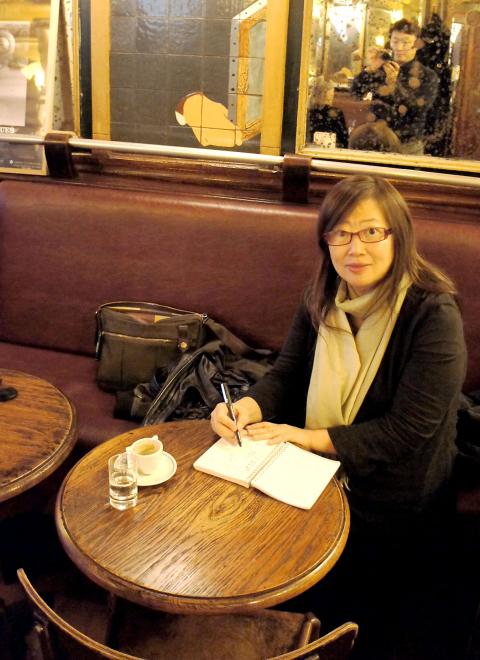Taiwanese gourmet and writer Lucille Han (韓良露) died of a rare cancer on Tuesday, aged 57.
Han was diagnosed with uterine sarcoma, which affects the muscle and supporting tissues of the uterus, about two months ago, after a trip to France with her husband in January, one of her friends said.
Despite treatment at Taipei Veterans General Hospital after returning to Taiwan, Han died early on Tuesday morning at the hospital.

Photo courtesy of WebGene
Han, who began publishing poetry at 16, is known for writing about topics including food, music, movies and travel inspired by her stays in the UK and trips to about 60 other countries.
She also wrote prose and scripts for TV and movies, which won her prizes including the Taipei Literature Award and the Golden Bell Award — Taiwan’s highest honors for radio and TV.
In 2007, the Kaohsiung native cofounded “South Village” near National Taiwan Normal University in Taipei, a social enterprise that offers food as well as creative and cultural events in support of the “slow food movement.”
Han has also been active in other food crusades including the campaign for healthier food, as well as the protest against the poor-quality yet high-price food sold at the nation’s airports.
Han is the second high-profile local food writer to die this year. In mid-February, Wang Hsuan-yi (王宣一), mother of London-based Taiwanese fashion designer Apu Jan (詹朴), died of heart failure during a trip to Italy.

Alain Robert, known as the "French Spider-Man," praised Alex Honnold as exceptionally well-prepared after the US climber completed a free solo ascent of Taipei 101 yesterday. Robert said Honnold's ascent of the 508m-tall skyscraper in just more than one-and-a-half hours without using safety ropes or equipment was a remarkable achievement. "This is my life," he said in an interview conducted in French, adding that he liked the feeling of being "on the edge of danger." The 63-year-old Frenchman climbed Taipei 101 using ropes in December 2004, taking about four hours to reach the top. On a one-to-10 scale of difficulty, Robert said Taipei 101

Nipah virus infection is to be officially listed as a category 5 notifiable infectious disease in Taiwan in March, while clinical treatment guidelines are being formulated, the Centers for Disease Control (CDC) said yesterday. With Nipah infections being reported in other countries and considering its relatively high fatality rate, the centers on Jan. 16 announced that it would be listed as a notifiable infectious disease to bolster the nation’s systematic early warning system and increase public awareness, the CDC said. Bangladesh reported four fatal cases last year in separate districts, with three linked to raw date palm sap consumption, CDC Epidemic Intelligence

Two Taiwanese prosecutors were questioned by Chinese security personnel at their hotel during a trip to China’s Henan Province this month, the Mainland Affairs Council (MAC) said yesterday. The officers had personal information on the prosecutors, including “when they were assigned to their posts, their work locations and job titles,” MAC Deputy Minister and spokesman Liang Wen-chieh (梁文傑) said. On top of asking about their agencies and positions, the officers also questioned the prosecutors about the Cross-Strait Joint Crime-Fighting and Judicial Mutual Assistance Agreement, a pact that serves as the framework for Taiwan-China cooperation on combating crime and providing judicial assistance, Liang

US climber Alex Honnold left Taiwan this morning a day after completing a free-solo ascent of Taipei 101, a feat that drew cheers from onlookers and gained widespread international attention. Honnold yesterday scaled the 101-story skyscraper without a rope or safety harness. The climb — the highest urban free-solo ascent ever attempted — took just more than 90 minutes and was streamed live on Netflix. It was covered by major international news outlets including CNN, the New York Times, the Guardian and the Wall Street Journal. As Honnold prepared to leave Taiwan today, he attracted a crowd when he and his wife, Sanni,